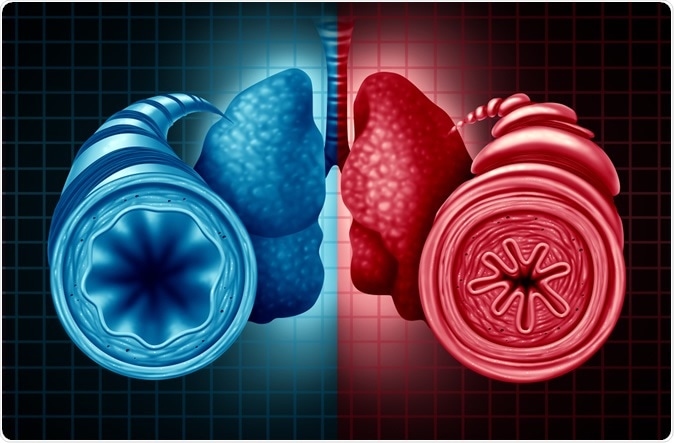On the 11th of March 2020, the World Health Organization (WHO) declared COVID-19, caused by severe acute respiratory syndrome SARS CoV-2, a pandemic.
.jpg)
Novel Coronavirus SARS-CoV-2: This scanning electron microscope image shows SARS-CoV-2 (round gold objects) emerging from the surface of cells cultured in the lab. SARS-CoV-2, also known as 2019-nCoV, is the virus that causes COVID-19. The virus shown was isolated from a patient in the U.S. Credit: NIAID-RML
Since its first detection in Wuhan, Hubei, China, in December 2019, the virus has affected people in nearly 200 countries and around 1.25 million people across the world. COVID-19 can affect the respiratory tract – the nose, throat, and lungs and can lead to acute respiratory illness and pneumonia. Among those with asthma, it may lead to severe attacks of shortness of breath and asthma. Preliminary studies have shown that those with asthma and other long term lung diseases are more at risk from COVID-19 related severe and life-threatening illnesses.

Image Credit: Lightspring / Shutterstock
Recommendations from the CDC
The Centre for Disease Prevention and Control, CDC, has an advisory for patients with respiratory diseases on their website. According to their general recommendations;
- All individuals are recommended not to venture out and stock up on their necessary supplies. Staying at home for as much time as possible can protect from the infection.
- Physical distancing from others is an important way to prevent the spread of the infection from one individual to another.
- Avoidance of crowds and crowded places and staying away from those who are ill.
- Cruise travel and non-essential air travel should be avoided for now. Since most nations have already stopped non-essential travel, this has been ensured.
- Hands should be cleaned using soap and water, and when these are not available, they should be cleaned using alcohol-based hand sanitizer.
- If one of the persons at home is ill with COVID-19, they need to be kept away from the rest of the household in order to reduce the risk of transmission to the other members of the household.
- Personal items of use such as utensils, cutlery, linen, towel, and clothes should be kept separate.
Special precautions to be taken by asthmatics as per CDC recommendations include;
- The symptoms of asthma need to be kept under control using medications as advised by a physician.
- The use of inhalers with steroids in them as recommended by physicians is needed.
- Medications prescribed for asthma control should not be stopped, nor the asthma treatment plan altered without consultation with the physician.
- An emergency supply of inhalers and asthma medications needs to be ensured by talking to the healthcare providers, pharmacists, and insurers. The CDC recommends that all asthmatics, as well as others with long term ailments, need to have at least 30 days of prescription and non-prescription drugs at home in case they need to be homebound for long periods of time.
- For asthmatics, all triggers of asthma should be avoided
- Inhaler use correctly is also important
- Persons with asthma in the community may cause anxiety, which may act as a trigger for asthma. Steps should be taken to control anxiety and stress during this time.
- Dust can be a trigger for asthma. During COVID-19 pandemic, cleaning and disinfection of the home could be vital. The CDC recommends that those with asthma should not be the ones involved in cleaning and should be away from the room when cleaning is done.
- The house should be aired and well ventilated using fans and open doors and windows.
- Not just in homes of asthmatics, in other homes as well, frequently touched surfaces such as phones, remotes, tables, switches, doorknobs, handles, etc. need to be disinfected with soap and water.
- In case of symptoms, health care providers need to be contacted immediately.
Recommendations from other organizations
The WHO lists asthma as one of the risk factors that can make someone “more vulnerable to becoming severely ill with the virus.” The Asthma and Allergy Foundation of America also warns that those with asthma and other respiratory illnesses should “take precautions when any type of respiratory illness is spreading in their community.”
The AAAAI (The American Academy of Allergy, Asthma, and Immunology) also states on its webpage, “The SARS-CoV-2 virus (like SARS-CoV and MERS-CoV, the two other pandemic coronaviruses) does not seem to cause asthma exacerbations. Nonetheless, it is always important for asthma patients to keep their asthma under the best possible control.” They explain that if asthma is kept under control, the lungs could be best prepared for an infection or allergen to cause an exacerbation of asthma. They also remind asthmatics during this pandemic that they should practice social distancing, stay at home, and wash their hands frequently. This would prevent them from getting COVID-19, they wrote.
Coronavirus advice: should you be getting extra asthma medication?